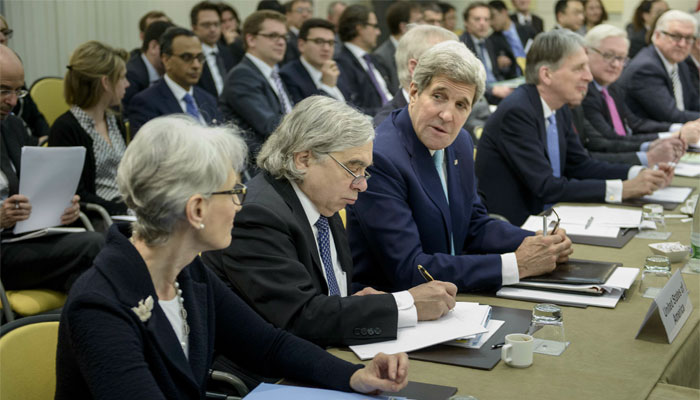From left US Under Secretary for Political Affairs Wendy Sherman, US Secretary of Energy Ernest Moniz, US Secretary of State John Kerry, British Foreign Secretary Philip Hammond, Russian Deputy Foreign Minister Sergei Ryabkov and German Foreign Minister Frank Walter Steinmeier wait for a meeting with officials from P5+1, the European Union and Iran at the Beau Rivage Palace Hotel in Lausanne.
AFP/Lausanne
The United States warned Tuesday that a midnight deadline to agree the outlines of a deal aimed at stopping Iran obtaining nuclear weapons may be missed, saying marathon talks in Switzerland may stretch into Wednesday.
In Israel, Prime Minister Benjamin Netanyahu issued his third broadside against the deal in as many days, saying it will "pave the way" to an Iranian nuclear bomb.
A senior US State Department official said negotiators would "keep working... if we are continuing to make progress, including into tomorrow (Wednesday), if it's useful to do so."
"At this time, no decisions have been made about our travel schedule," the official said, adding that the US delegation was evaluating the progress made so far.
As Russian Foreign Minister Sergei Lavrov returned to the negotiations in Switzerland, an Iranian negotiator said progress was being made, but "slowly".
"We are advancing but slowly. In view of the complexity of the issues and the fact that this is the final look at the issues, it is happening slowly," said Behrouz Kamalvandi. "We have to show patience."
Lavrov, whose return completed the line-up of foreign ministers from all six major powers, said before leaving Moscow that the chances of an accord were "high".
"The prospects of this round of talks are not bad, even good I would say," he said. His spokeswoman had said Monday Lavrov would only come if there was a "realistic" chance of success.
With an army of technical and sanctions experts having beavered away late into the night, the two sides are hoping to lay the groundwork for ending the 12-year-old crisis over Iran's nuclear ambitions.
The stakes are high, with fears that failure to reach a deal may set the United States and Israel on a road to military action to thwart Iran's nuclear drive, which Tehran says is purely peaceful.
Low on detail?
Under a deal to be finalised by June 30, the powers want Iran to scale back its nuclear programme to give the world ample notice of any dash to make the bomb by extending the so-called "breakout" time.
In return, the Islamic republic is demanding the lifting of sanctions that have strangled its economy.
But the question is how much of this will be in the framework accord that Iran and the six powers -- the US, China, Russia, Britain, France and Germany -- want to reach by midnight (2200 GMT).
If it falls short of firm commitments by Iran then US President Barack Obama will find it hard to fend off attempts by his Republican opponents to pass fresh sanctions on Tehran.
Iran's negotiators are also under pressure from their own domestic hardliners not to give too much away and for President Hassan Rouhani to deliver on his promises to secure the lifting of sanctions.
Fresh US sanctions could therefore torpedo the whole negotiating process that was launched after Rouhani became president in 2013.
Republicans fear that since some of its nuclear infrastructure will likely stay intact, Iran will still be able to get the bomb -- a concern shared by Netanyahu, whose country is widely assumed to have nuclear weapons itself.
"The greatest threat to our security and our future was and remains Iran's attempt to be armed with nuclear weapons. The agreement being formulated in Lausanne paves the way to that goal," Netanyahu told parliament.
"We will do everything to protect our security and our future."
Saudi Arabia, which has led an Arab coalition bombing Iran-backed rebels in Yemen in recent days, is also alarmed by what is unfolding in Lausanne.
Its Foreign Minister Prince Saud al-Faisal called on the six powers not to "short-circuit the interests of the states of the region by dangling before Iran benefits that it will not be able to reap without cooperation with the countries of the region".
Some areas sewn up
Some areas of the mooted deal, including the future size of Iran's uranium enrichment capacity -- a process for making nuclear fuel but also the core of an atomic bomb -- appear to have been tentatively sewn up.
But the two sides still appear wide apart on other areas, including what to do with Iran's stockpiles of nuclear material and the pace at which sanctions would be eased.
The six powers are only prepared to suspend sanctions, not terminate them, in order to be able to put them back into place if Tehran violates the deal.
Other tricky issues include the duration of any accord, with Iran resisting demands by the powers to submit to ultra-tight inspections by the UN atomic watchdog for at least a decade.

